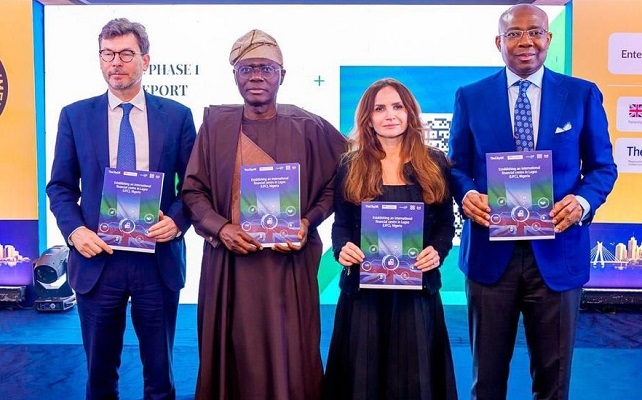News
AMMBAN Decries Mandatory CAC Registration of POS Agents

Association of Mobile Money and Bank Agents of Nigeria (AMMBAN) has decried the directive coming from the Corporate Affairs Commission mandating all Point Of Sale (POS) agents to register with the commission.

At a press conference which was held over the weekend in Lagos, the group insisted that the reason tendered by the commission that the registration was to curb crime in the Fintech space was not tenable, maintaining that it was purely a revenue drive agenda.
In a paper read by the National General Secretary, Oluwasegun Elegbede on behalf of the President of the association, Fasasi Sarafsdeen Atanda said, “The Association of Mobile Money and Bank Agents of Nigeria (AMMBAN) strongly disagrees with the recent directive by the Corporate Affairs Commission (CAC) that all POS agents must register with it, regardless of their status as individuals or non-individuals. We believe this directive is unnecessary, contradictory to existing laws, and amounts to a mere revenue generation move to further tax hapless Nigerians.”
AMMBAN maintained that the reason that the directive was designed to curb crime in the financial space was not tenable. “We disagree with CAC’s claim that it wants to fight crimes in the agency agency banking business space through registration. We believe that the kind of crimes in the space are both human and technical, which CAC registration cannot fight.”
Referring to Section 18 (1) of CAMA which states that “A person may apply to the commission for the registration of a company” and section 22(1) states that “A company shall be deemed to be a separate legal entity from its members.”
The group insisted that what this means is that individuals and non-individuals (companies) have different legal statuses and requirements. Moreover, the CBN Policy on financial inclusion and development states that “agency banking services shall be provided by agents who are individuals or non-individuals (companies) registered with the CBN (Section 2.1).
“The group disclosed that the policy clearly recognized the distinction between individuals and non-individuals and does not require individuals to register with CAC,” the paper read.
AMMBAN disclosed that it has made and still making spirited efforts in combating the issue of crimes within their business space, and condemned the insistence of CAC to deploy the police to execute the directive against those who fail to register their business by July 7.
The group while denying allegation credited to the Economic and Financial Crimes Commission (EFCC) that AMMBAN members are colluding with bank staff to hoard cash or engage in buying and selling of cash. Aside asserting that the allegation was misleading, they also stated that it is damaging to the reputation of their members who are law-abiding citizens.
“Our association finds it criminal for anyone to buy and sell cash, as our role is to bring succour to the general populace at a very convenient cost to serve.” And they also called on the commission to endeavor to prove their case beyond reasonable doubt.
AMMBAN also categorically denied allegation that her members are responsible for scarcity of cash, adding that her members are also facing similar challenge because their agents are not given any preferences in accessing cash from the bank, saying, “it has been a long standing demand that the CBN categorize agencies into different tiers to enable them to have access to cash, rather than seeing them as individuals with a limit of N500000. This will help to address the current cash scarcity and promote financial inclusion.”
The group further said that they reject the CBN ‘s policy limiting multiple accounts/wallets to two. They added that the policy has crashed the agent network category and is an attack on financial inclusion. “We urge everyone to work together to promote financial inclusion and economic growth, rather than engaging in activities that can undermine the progress made so far.”
Chairman of AMMBAN, Fasasi Sarafadeen Atanda disclosed that their members have lost millions of jobs due to inconsistent policies in the Fintech space. “People are asking us why are we taking this step, we are taking this step to save millions of jobs in Nigeria, because it is not just about POS, it is actually beyond POS.
“We know the implications of most of these policies that are not well thought out and their impacts on the economy generally. As of today since the beginning of the cashless policy and the cash redesign policies last year, to the level of NIN and BVN linkage and then the recent policies of asking all agents to go and register with CAC, and lots of policies being dished out to providers internally via internal memo, such as restriction on how many accounts an agent can have, all these policies have led to the following statistics: We have lost over 1.5 million jobs in the last one year.”
He said there are over 3.7 million POS in circulation as of today, but the service providers were only able to deploy 2.7, leaving the gap of 1million POS amounting to a loss of 1million jobs in Nigeria.
He further added “Also agents that are utilizing Fintech solutions, they are utilizing mobile apps, they are utilizing websites, they are also exploring digital and Fintech solutions, that space alone is employing hundreds of jobs, in the form of app developers, UI, US Engineers and all others in that space, we have lost cumulatively 200,000 jobs.
He also stated that the aggregators were not left out in the policy summersaults. “And aggregators, we have about 217 registered Fintech companies in Nigeria and most of them are adopting the strategy of aggregators. Who are the aggregators or who are the agent network?
They are the people that are stepping down all the services of financial institutions. You have aggregators that are helping providers to deploy and manage US terminals and each and every one of these 217 registered Fintech, they have a minimum of a 1000 aggregators. So when you multiply a thousand with at least, 200 out of the 217, you can see the number of jobs that have been lost through that.”
He also said that Nigeria has lost a lot of foreign direct investment.
News
Lasaco Assurance Gets Shareholders Approval to Advance Capitalization Plans

Lasaco Assurance Plc has received formal commitment letters from shareholders following its recent Extraordinary General Meeting, strengthening confidence in the company’s plan to raise additional capital in line with regulatory requirements and ongoing insurance sector reforms.

Speaking on the development, Ademoye Shobo, acting managing director of Lasaco Assurance Plc, said the confirmation from shareholders provides clarity and certainty as the company moves to execute its approved capital-raising strategy.
“The commitment letters from our shareholders give us the confidence to proceed with our capitalisation plans in line with the Nigerian Insurance Industry Reform Act (NIIRA) 2025 and other regulatory requirements guiding the insurance industry.
“We will leverage all available opportunities to raise the approved capital, and our existing shareholders should watch out for our rights issue as part of the process,” Shobo said.
With shareholders’ backing now formally documented, Lasaco Assurance Plc plans to actively pursue available funding options to deliver the approved capital raise. The company plans to deploy a mix of market-based instruments, including a rights issue and other permissible fundraising structures, to ensure timely and effective capital mobilisation.
The Management noted that the commitment letters reinforce investor confidence in the company’s growth strategy, governance framework, and long-term outlook. The capital raise is expected to support balance sheet strengthening, improve underwriting capacity, and provide greater flexibility for business expansion across core insurance segments.
As part of the process, existing shareholders have been advised to watch out for the forthcoming rights issue, which will provide them with the opportunity to participate proportionately in capital expansion. The company reaffirmed its intention to ensure transparency and regulatory compliance throughout the fundraising exercise.
Lasaco Assurance Plc views the capitalization drive as a strategic step toward sustaining competitiveness, enhancing risk-bearing capacity, and positioning the company for future growth within Nigeria’s insurance market. The initiative also aligns with broader industry efforts aimed at strengthening the company’s financial resilience and protecting policyholders’ interests.
News
Ecobank Nigeria to Host Customer Forum on Strengthening Regional Integration for Economic Transformation

Ecobank Nigeria is set to host the second edition of its Customer Forum, at the Ecobank Pan-African Centre, Ozumba Mbadiwe Avenue, Victoria Island, Lagos.

The forum, organised by the bank’s Fixed Income, Currencies and Commodities (FICC) Business (Treasury), is themed ‘Strengthening Regional Integration for Economic Transformation.’
It is designed to examine critical issues shaping Nigeria’s and Africa’s economic outlook in 2026, with particular focus on trade, financial markets, foreign exchange liquidity and regional integration, especially as the African Continental Free Trade Area (AfCFTA) agreement enters a strategic phase of implementation.
Announcing the event in Lagos, the Regional Treasurer, Ecobank Nigeria Limited, Olumide Adebayo, said the one-day programme reinforces the bank’s role as a trusted financial partner and customer-focused institution, with intention to foster dialogue, support informed decision-making and deeper regional economic integration across Africa.
According to him, the programme will open with welcome remarks by the Managing Director/Regional Executive, Ecobank Nigeria, Mr. Bolaji Lawal, who will underscore the bank’s commitment to supporting customers and driving inclusive growth through strategic dialogue, innovation and pan-African collaboration.
The keynote address, titled ‘The Future of Trade in Africa: Harnessing the AfCFTA for Economic Transformation,’ will be delivered by the Group Chief Economist & Managing Director, Research and Trade Intelligence, African Export-Import Bank (Afreximbank), Dr. Yemi Kale.
His address will provide insights into Africa’s trade prospects and the transformative potential of the AfCFTA.
The forum will feature two high-level panel discussions: balancing the Risk between Interest Rate and Exchange Rate: Business Expectations and Outlook in 2026 and Export Proceeds, Oil Receipts and Remittances in 2026: Exploring Options that Best Support FX Liquidity and Flows in Nigeria.
The event would be moderated by Messrs. Aruoture Oddiri, Host and Producer of Global Business Report on Arise News and Barnabas Vajeh of Ecobank Nigeria Limited.
Ecobank Nigeria is a member of the Ecobank Group, the leading pan-African banking institution with operations in 33 African countries and international offices in London, Paris, Beijing and Dubai.
With over 220 branches, more than 36,000 agency banking locations, and robust digital platforms, Ecobank delivers accessible, affordable, and instant banking services. The bank is strategically positioned to support pan-African trade, particularly under the African Continental Free Trade Area (AfCFTA).
News
Lagos to Establish West Africa’s Premier International Financial Centre

TheCityUK, in partnership with the UK Government, Lagos State Government, Lagos International Financial Centre Council (LIFCC), and EnterpriseNGR, have unveiled a landmark report, “Establishing an International Financial Centre in Lagos (LIFC), Nigeria”, outlining a strategic roadmap to transform Lagos into the West African hub for international investment capital driving innovation, and sustainable growth across the country and the wider region.

The LIFC initiative aligns with Nigeria’s Agenda 2050 and the Lagos State Development Plan 2052, to deliver long-term economic prosperity, deepen financial markets, and attract productive global investment. The project showcases the power of public-private partnership, bringing visionary leadership from the government together with private sector companies seeking to tap into Nigeria’s young, dynamic market to deliver economic growth.
The report was launched at an event at State House Marina with guests including Lagos State Governor, Babajide Sanwo-Olu, British Deputy High Commissioner Jonny Baxter, and EnterpriseNGR Board Chairman and CEO, Aigboje Aig-Imoukhuede and Obi Ibekwe.
Key Highlights from the Report:
- Strategic Vision: The LIFC will support Nigeria’s ambition to become an upper-middle-income country by 2050, driving inclusive growth, reducing poverty, and creating high-value jobs, especially for Nigeria’s talented youth.
- International Collaboration: The report highlights the benefit of strong UK-Nigerian co-operation, building on best practices and global benchmarks to align the LIFC with international standards.
- Model Recommendation: The report recommends the development of an independent IFC model for Lagos, and the steps to achieve this. An IFCwill deliver, regulatory clarity, simplified tax and policy settings and offer greater investor confidence and economic benefits for the wider Nigerian economy.
- Unique Selling Points: The LIFC should focus on areas which can deliver the greatest economic benefits matched to investor interest. Consultations have suggested three areas for its initial focus: Green and Sustainable Finance, FinTech & Innovation, and Commodities Trading & Capital Markets. These sectors are identified as key drivers for Nigeria’s future competitiveness and growth.
- Governance and Legal Reform: The report calls for robust legal and regulatory frameworks, an independent governance framework, and strong collaboration between Lagos State, Federal Government, and private sector stakeholders to drive the implementation of the IFC.
- Talent and Human Capital: A focus on developing domestic talent, easing visa regimes for international professionals, and building a pipeline of skilled workers will underpin the LIFC’s success.
- Tax and Incentives: Recommendations include competitive tax regimes, tailored incentives for investment that aligns to the national vision, and streamlined business processes to attract global capital.
On the report, Babajide Sanwo-Olu, Lagos State Governor, said, “Lagos is fully committed to the birth of the International Financial Centre. We know that it is a veritable means of supporting seamless trading and to enhance competitiveness of financial markets.
As Nigeria’s largest economic and financial centre, Lagos plays a critical role in driving the nation’s capital markets. We need to create an ecosystem that will help to facilitate investment flows, enhance market liquidity, and promote financial literacy.
“The LIFC initiative will not only strengthen our market infrastructure but also unlock new opportunities for public-private partnerships in technology and capital market development. It will support seamless trading, attract foreign investment and enhance competitiveness of financial markets.”
Jonny Baxter, British Deputy High Commissioner, commented; “The launch of the Lagos International Financial Centre report reflects the deepening of UK-Nigeria partnership, combining Lagos’s comparative strengths with UK expertise.
Anchored in clear, evidence‑based analysis and launched at a pivotal moment in Nigeria’s reform journey, the LIFC has the potential to unlock major domestic and international investment, deepen capital markets, create jobs, and drive sustainable economic growth across the country, not just in Lagos State.”
Nicola Watkinson, Managing Director, International, TheCityUK, said, “Nigeria is a high-growth, dynamic and large market and the Lagos International Financial Centre could be vital to its future.
By building a modern, integrated business and regulatory environment and financial ecosystem, the LIFC will support the attraction of global and domestic capital, deepen domestic markets, facilitate innovation in FinTech and green finance, and create high‑value jobs for Nigeria’s youth.
“Supporting the development of Lagos as an international financial centre is a clear example of how the UK and Nigeria are deepening their strategic partnership.”

 E-Financial3 days ago
E-Financial3 days agoAlawuba Advocates Security, Bankable Projects, Infrastructure Development to Promote South-East Vision

 Telecom2 days ago
Telecom2 days agoNCC Committed to Regional Digital Integration – Maida

 General News2 days ago
General News2 days agoIndigenous Firm Deploys 400,000 Smart Electricity Meters in 2025

 E-Financial2 days ago
E-Financial2 days agoCBN Expresses Concern Over Foreign Investments in Nigeria Fintechs

 E-Financial2 days ago
E-Financial2 days agoBOI Secures CBN Nod for Sharia Banking, Unlocks Ethical Funding Boom

 Telecom2 days ago
Telecom2 days agoITU Top Director Visits NITDA, Boosts Nigeria’s Digital Literacy Push

 E-Financial2 days ago
E-Financial2 days agoUBA’s Easy and Instant Account Opening Thrills Returnee

 News2 days ago
News2 days agoEFInA Unveils Research Fellowship Programme to Deepen Financial Inclusion Impact

























